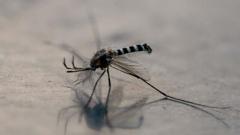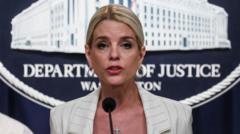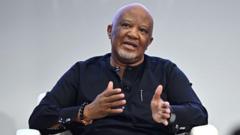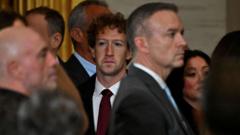A freeze on overseas aid from the United States, as initiated by President Trump, has led to significant disruptions in crucial health programs internationally, affecting treatment and prevention services for diseases like HIV. The WHO emphasizes urgent need for resumed funding and collaboration to combat these consequences.
US Aid Freeze Disrupts Global Health Initiatives, WHO Warns
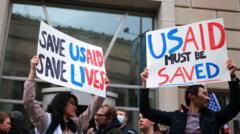
US Aid Freeze Disrupts Global Health Initiatives, WHO Warns
The World Health Organization reports that a US aid freeze has impacted health programs in 50 countries, with severe implications for HIV, polio, and vaccine developments.
The World Health Organization (WHO) has issued a grave warning regarding a freeze on aid from the United States, stating that nearly fifty countries are facing critical disruptions to essential health programs. Under the leadership of President Donald Trump, significant funding through the United States Agency for International Development (USAID) has been halted, affecting efforts to tackle diseases such as HIV, polio, mpox, and bird flu.
In recent remarks, Dr. Tedros Adhanom Ghebreyesus, the WHO chief, highlighted the serious implications of the US government's actions, stating, “There are actions that the US government is taking... which we're concerned are having a serious impact on global health.” Particularly concerning is the suspension of the President’s Emergency Plan for Aids Relief (PEPFAR), which has halted HIV treatments and vital testing services in numerous countries.
The ramifications of this funding freeze are stark: health facilities are shutting down, and workers are being furloughed, leading to fears of disease resurgence and delays in vaccine development. Experts warn that such interruptions could have a cascading effect on health systems worldwide amid an ongoing fight against infectious diseases.
Trump has characterized USAID as “totally unexplainable” in its spending, asserting that it is beset by issues of incompetency and corruption. Consequently, he has enacted substantial cuts to the agency’s workforce and suspended multiple aid programs, notable for spending approximately $40 billion annually on humanitarian aid—primarily addressing health needs in Asia, sub-Saharan Africa, and Europe.
Controversially, tech billionaire Elon Musk echoed Trump’s sentiments, labeling USAID a “criminal organisation,” although neither has provided conclusive evidence to substantiate these claims. The current administration’s withdrawal from WHO funding further complicates international health collaborations, as well as data sharing related to health threats like bird flu.
In response to the aid shortfall, the WHO has resorted to emergency measures reminiscent of those implemented during the Covid pandemic to mitigate the impact on life-saving medications such as antiretrovirals for HIV patients. Meg Doherty, director of global HIV programs at the WHO, noted attempts at inter-country cooperation for medicine sharing, underscoring the need for a more sustainable and long-term solution.
As the world grapples with public health challenges, the urgent call from WHO reflects a burgeoning crisis in global health infrastructure stemming from the fallout of US foreign aid policy shifts.







